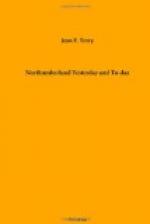Worcester. These same noble
Scots
That are your prisoners—
Hotspur. I’ll keep them all; By heaven, he shall not have a Scot of them; No, if a Scot would save his soul, he shall not; I’ll keep them, by this hand.
Worcester. You start away,
And lend no ear unto my purposes.
Those prisoners you shall keep.—
Hotspur. Nay, I will, that’s flat:— He said he would not ransom Mortimer; Forbade my tongue to speak of Mortimer; But I will find him when he lies asleep, And in his ear I’ll holla “Mortimer!” Nay, I’ll have a starling shall be taught to speak Nothing but “Mortimer,” and give it him To keep his anger still in motion.
The First Part of KING HENRY IV., Act I., Scene 3.
The fight at Homildon Hill took place on a Monday in August, 1402, and the memory of it is kept alive by the name of the “Monday Clough” near Wooler, where the archers commenced the fight.
More than a hundred years after this, the last, and in many respects the greatest, battle ever fought on Northumbrian soil took place at Flodden. King James IV. of Scotland had several grievances against England, which had rankled in his mind for some time; he had not yet received the full amount of the dowry which had been promised with his wife, Margaret Tudor, sister of Henry VIII., although they had been married for many years; a Scottish noble, Sir Robert Ker, had been killed in Northumberland, and the slayer could not be found to be brought to justice—he was outlawed, but that seemed to King James very insufficient; a Border raid on a large scale, led by Lord Hume, had met with disastrous defeat on Milfield Plain at the hands of Sir William Bulmer; and Andrew Barton, a notable sea-captain, whom James was looking forward to seeing as one of the best leaders of his new navy, had been killed in a sea-fight by Thomas Howard, Lord Admiral of England. Added to all this, France had appealed to him to invade England in order to force Henry VIII. to abandon his French war; the English monarch was just then conducting the siege of Terouenne, and the Queen of France sent a romantic appeal to James (together with a large sum of money) begging him to march “three feet on to English ground” for her sake.
No time could have been more favourable in James’ eyes for the enterprise; and in a very short space of time he had an army of 100,000 men collected, and marched from Edinburgh to the Tweed, which he crossed near Coldstream. He laid siege to Norham, and captured it after a week’s investment; and thereafter Wark, Ford, Etal, Duddo and Chillingham fell before him. He took up his quarters at Ford Castle, and on marching later to meet Surrey, left it almost in ruins.




